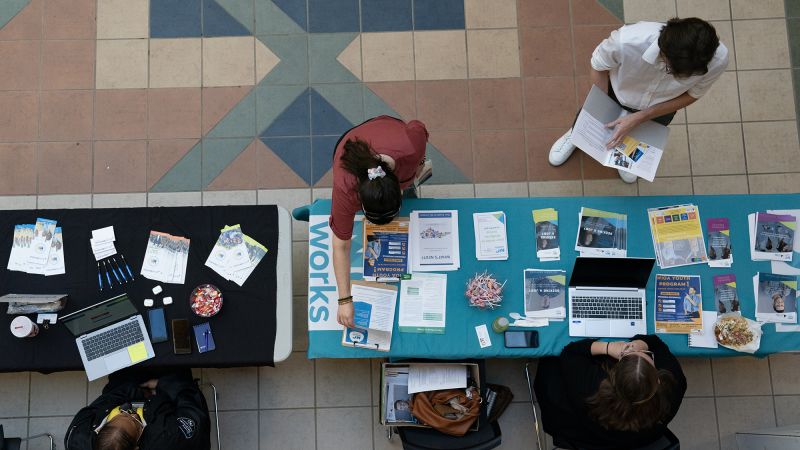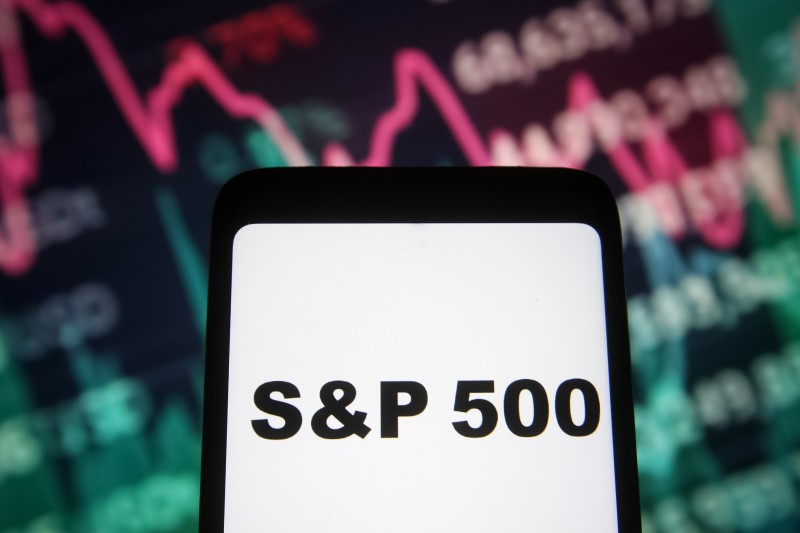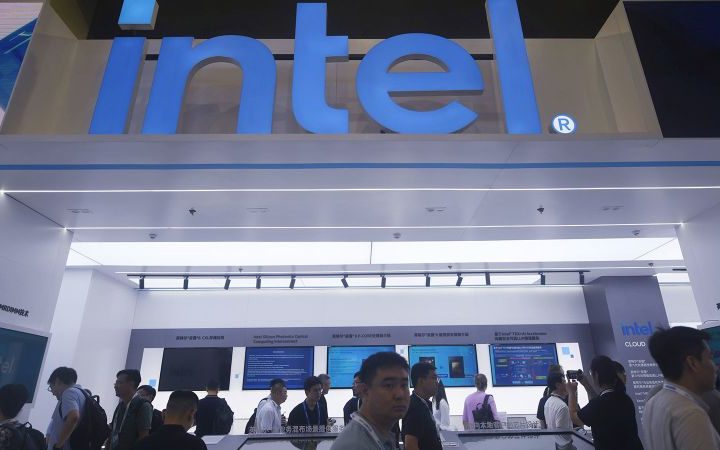A version of this story first appeared in CNN Business’ Before the Bell newsletter. Not a subscriber? You can sign up right here. You can listen to an audio version of the newsletter by clicking the same link.
Welcome to an economic version of the chicken-or-the-egg dilemma: With interest rates at their highest level in 22 years, what will weaken first? The job market or spending?
When people spend less, companies have less money to pay employees and can begin to lay people off as their profits get squeezed. And when companies cut staff, people have less money to spend.
This year, consumers have kept spending and businesses have kept on hiring.
But economists can’t agree on why: Some argue that the strong job market has been spurring robust consumer spending, while others say employers have been able to hire at a solid clip precisely because of strong consumer demand.
Consumer spending accounts for about 70% of US economic output, so it’s key in gauging the health of the American economy and its direction.
Plenty of nuances make it tough to determine whether spending or hiring will weaken first, such as the effects of pandemic savings some (mostly high-income) Americans might still possess, lingering pent-up demand for certain goods and services, and how broader economic circumstances vary from one business cycle to another.
The jobs argument: “It’s a little bit of a tough question,” Shannon Seery, an economist at Wells Fargo, told CNN. “It’s never that perfect, but I think the first shoe to drop is on the labor side.”
The US job market has clearly slowed from its breakneck pace in 2021 and 2022, after it ascended from pandemic depths, but it remains healthy.
Employers added 150,000 jobs in October, a much smaller gain than September’s 297,000, but well above the minimum job gain needed to keep up with population growth — somewhere between 70,000 and 100,000. Unemployment remains low and job openings are still at historically high levels.
“The labor market moderating can cause income to slow and for consumers to become less confident in their job situation, typically affecting spending, and with slower demand then you’ll have layoffs,” Seery said.
The spending argument: But there have been instances in which spending weakened before the job market.
The first shoe to drop that led to the Great Recession in 2008 was actually the housing bust and its impact on spending, according to Luke Tilley, chief economist at Wilmington Trust Investment Advisors.
“That chicken-and-the-egg story can differ from one cycle to the other,” Tilley said. “During that time, consumer spending was driven so significantly by home equity and then by the middle of 2006 it was on a downward trend.”
Companies didn’t begin to consistently shed jobs until around the turn of 2008, which was when that recession officially began, according to the National Bureau of Economic Research.
The US economy’s situation is vastly different this time because it is still dealing with the aftermath of the massive disruption caused by the Covid-19 pandemic.
In response to a question posed by CNN Wednesday, Fed Chair Jerome Powell at a news conference said there is still this “unwinding of the pandemic effects,” which has been “what makes this cycle unique.”
This time around, “businesses facing a tougher environment would lead to them cutting jobs, then there will be cutbacks in spending,” Tilley said.
The Federal Reserve has raised interest rates 11 times since March 2022 to their highest level in 22 years in a bid to combat high inflation. Not only has that made it more expensive for US consumers to borrow, but also for businesses.
When companies expand their operations or buy equipment, it’s often done with credit. That means higher interest rates are certainly squeezing businesses, but it still remains unclear how long it’ll be until they begin to cut back on labor in a more pronounced way as they attempt to safeguard their bottom line.
How perception could play a role: And perhaps the first lever to be pulled may not even be spending or layoffs.
“I think it starts with the perception of the labor market,” Drew Matus, chief market strategist at MetLife Investment Management, told CNN. “If consumers see that a job opening in their division isn’t being filled, that gets them thinking that the labor market is actually weakening and that maybe every firm is doing the same thing.”
The perception that the job market is faltering then “causes people to boost their savings rate a little more, putting away more money for a rainy day, and when everyone does that, it creates the rainy day that they’re preparing for,” he added.
Taylor Swift and Beyoncé concerts deliver record-breaking earnings for Live Nation
Live Nation Entertainment has Taylor Swift and Beyoncé to thank for propelling the live concerts organizer to its strongest quarterly results to date, reports my colleague Parija Kavilanz.
The parent company of Ticketmaster, which drew the wrath of Swifties and lawmakers after botching ticket sales for the wildly successful Taylor Swift Eras Tour, on Thursday reported third-quarter 2023 revenue of $8.3 billion, up 32% from a year ago.
“Today we delivered our strongest quarter ever and are on pace for a record 2023,” Live Nation CEO Michael Rapino said in a statement.
The ticket-industry giant said it has sold a record 140 million tickets so far this year, up 17% year-over-year and has already surpassed the 121 million tickets sold in all of 2022. It said revenue from concerts jumped 32% to $7 billion.
Ticketmaster sold 257 million fee-bearing tickets so far this year, up 22% year-over-year. In the third quarter, Ticketmaster sales surged 57% to $833 million and 90 million fee-bearing tickets were sold in the period.
To be sure, live concerts returned with a bang in 2023, with Taylor Swift and Beyoncé becoming the hottest tickets in town. But a slew of stars took to the road this year, including Pink, Harry Styles, Bad Bunny, the Jonas Brothers and Bruce Springsteen.
Live Nation (LYV) is anticipating an equally robust 2024 for live concert, saying that about half of the shows booked for next year are for large venues and that trend is up double-digits from the previous year.
Monday: Earnings from Ryanair and Goodyear. Fed Governor Lisa Cook delivers remarks. China’s customs agency reports on the country’s trade surplus in October. The Reserve Bank of Australia announces its latest monetary policy decision.
Tuesday: Earnings from Uber, Occidental Petroleum, KKR, The Carlyle Group, and Robinhood. The US Commerce Department releases September data on exports and imports. Fed officials Michael Barr, Jeffrey Schmid, Christopher Waller, John Williams and Lorie Logan deliver remarks.
Wednesday: Earnings from Biogen, Warner Bros. Discovery, Roblox, Teva Pharma, Ralph Lauren, The New York Times Company, Under Armour, SeaWorld, Steve Madden, MGM Resorts, U-Haul, Duolingo, Affirm, and Lyft. Fed Chair Jerome Powell gives a speech. Fed officials John Williams, Michael Barr and Phillip Jefferson deliver remarks. China’s National Bureau of Statistics releases October figures on inflation.
Thursday: Earnings from Sony Group, Astrazeneca, Brookfield, Tapestry and News Corp. The US Labor Department reports the number of new applications for jobless benefits in the week ended November 4. Fed Chair Jerome Powell gives a speech. Fed officials Raphael Bostic and Tom Barkin deliver remarks.
Friday: Earnings from Soho House. The UK’s Office for National Statistics releases third-quarter gross domestic product data. European Central Bank President Christine Lagarde gives a speech. Fed officials Raphael Bostic and Lorie Logan deliver remarks. The University of Michigan releases its preliminary reading of consumer sentiment in November.
Read the full article here







